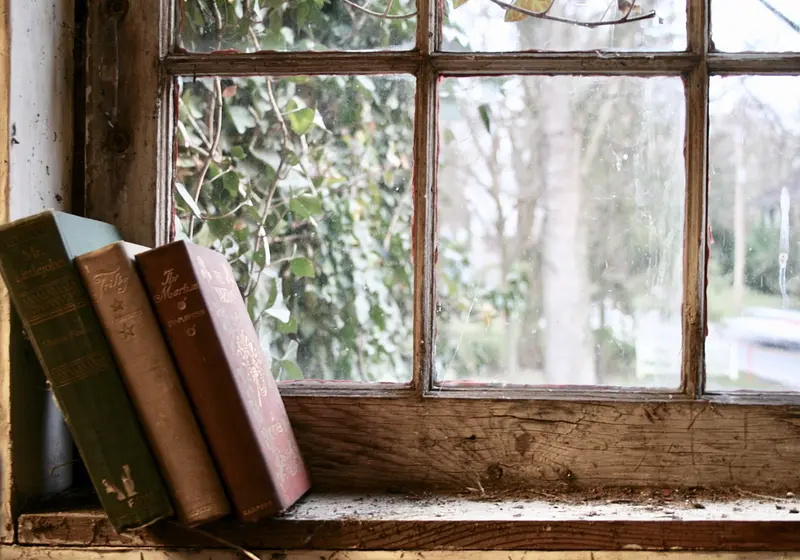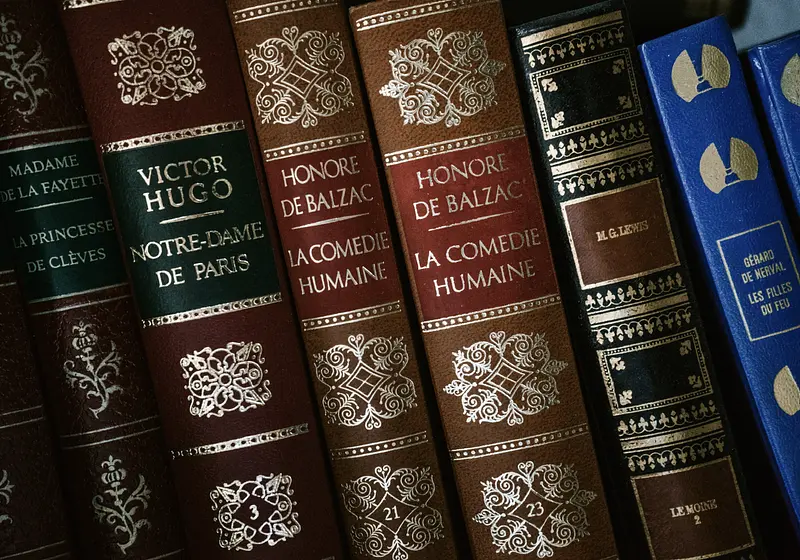Far removed from the dusty, remote shelves they're often placed on based off the assumption that they have little left to teach us, from Shakespeare to Thackeray, Gaskell to Fitzgerald, the novels of the past can still have an effect on us today. As someone who was converted to Austen at the age of 14 after an outdoor theatre performance of Sense and Sensibility at a local abbey (and then proceeded to consume every single piece of Regency media she could find), I know full well that books which were written about people going through the world the best way they could often still have the power to change how we think and feel today in a big way.
If you're looking for some reading inspiration and keen to delve back into the past, look no further than our list below.
Let us slide into your dms 🥰
Get notified of top trending articles like this one every week! (we won't spam you)1. Far from the Madding Crowd by Thomas Hardy
“Well, what I mean is that I shouldn’t mind being a bride at a wedding if I could be one without having a husband. But since a woman can’t show off in that way by herself I shan’t marry—at least yet.”
For those who feel out of place or in any way restless and dissatisfied, Bathsheba Everdeen is the patron saint of the ambitious romantic. Hardy's novel follows both her rise to influence on inheriting a farm, and her increase in desirability as a marital match that necessarily follows as well as the path of a neighboring farmer named Gabriel Oak after he suffers the loss of his sheep farm in one of the most devastating images I've ever read.
Both characters are made entirely three dimensional and you can't help but fall for the sincerity and stability of Gabriel Oak, while Bathsheba deals with managing a large working property as a woman in the 19th century and love interests, each of them offering something different and reflecting each stage of her life.
It's impossible not to relate to Bathsheba's quandaries over marriage and giving up influence, and how, through it all, she stays true to herself and her ambitions. Reading her experiences with love, who she is vs. who she wants to be, is cause for some deep self reflection and teaches a valuable lesson on what to prioritize going into a relationship.
Complement with: long walks in the countryside and good romantic choices.
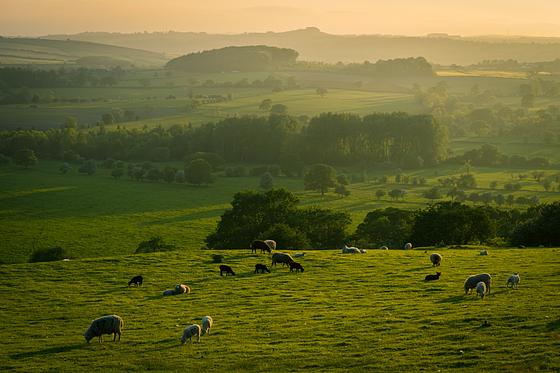
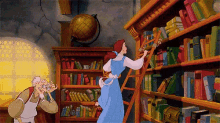
Take the Quiz: Which Literary Fiction Should You Read Next?
Jump into the world of literary fiction with the one of these novels based on your existing favourites.
2. An Ideal Husband by Oscar Wilde
“Even you are not rich enough, Sir Robert, to buy back your past. No man is.”
While yet to get through Dorian Grey, I have a permanent soft spot for Wilde's plays ever since seeing Rupert Everett's depiction of Lord Goring. An Ideal Husband, his lesser known play from the same year as "The Importance of Being Ernest", is worth being taken in from the page as the reader gets more time to enjoy the author's ingenious writing and comedic timing.
Wilde details the lives of four key characters and their own particular difficulties and quirks: Lord Goring is a perennial bachelor, seemingly unable to take anything seriously, his friend, Sir Robert Chiltern, is a politician with a secret threatening to be released that would upend his entire life and the foundation of his prosperity, his wife, Lady Chiltern stands as a pillar of Victorian morality and upholds an 'ideal' image of her husband, and Sir Robert's younger sister, Mabel Chiltern, is utterly in love with Lord Goring.
What "An Ideal Husband" teaches us through the dramatic twists and turns involved in the main goal of protecting the 'ideal' which Robert Chiltern has spent his political career building is to treat people with compassion and to not view the world as entirely black and white. Where Chiltern's heroism is called into question, Goring emerges as an unlikely defender, both calling into question their respective reputations and allowing for much more nuance in their characters.
Complement with: taking responsibility for your actions, an open mind and copious amounts of snarky wit.
3. A Room with a View by E.M. Forster
“About old Mr. Emerson — I hardly know. No, he is not tactful; yet, have you ever noticed that there are people who do things which are most indelicate, and yet at the same time — beautiful?”
If I could make one book mandatory reading for all teenagers who struggle with anxiety or self-confidence, this would be it. Forster's novel, written in 1908, focuses on ideas of identity, spiritualism and religion, gender equality and fate, all brought together by the characters of Lucy Honeychurch and George Emerson. It's impossible to describe just how beautifully this book is written and how delicately Forster deals with so much of human existence, but the quote above is as good as I could find.
As above, Forster throughout the novel challenges the idea of a 'should', whether in choices of who to marry, how a woman should behave or what/how religion should be followed. It is a glowing mantel to the mantra that life should be lived on your own terms. Lucy's relationships with the cast of entirely likable and irritating characters drives forward her own growth and the journeys of those around her as the Emersons, both George and his father, teach those around them to look at the world in a different way and with a much more open mind.
Cousin Charlotte in particular offers much to be hated, but, by the end, is as much a fabric of the book as the jolly vicar, Mr Beebe, or Cecil Vyse, a representation of Rome and the Gothic, a far less emotionally and physically connected person than George Emerson, who stands in for Florence where he meets Lucy with Charlotte in attendance as her guardian. As the novel starts in Florence and moves to Windy Corner in England, it's a wonderful read when the sun is shining and a glorious refuge when stuck in the depths of winter.
Complement with: the Florentine countryside (ideally) or a large bunch of violets, piano playing and the inimitable 1980s Merchant-Ivory production (the best and most faithful book-to-film adaptation I've ever seen).

4. Evelina by Frances Burney
"Unused to the situations in which I find myself, and embarrassed by the slightest difficulties, I seldom discover, till too late, how I ought to act."
The precursor to Jane Austen's most famous novel, "Evelina" is the story of a young girl who feels completely out of her depth in London high society and within hours is already doing entirely the wrong thing. Is there anything worse than making a fool out of yourself in a world you're entirely unprepared for? Frances Burney doesn't think so and I'm inclined to agree. The acute pain of teen life often comes from not knowing what to say or how to act and "Evelina" catches this beautifully.
Written in letters, it's the perfect read to pick up at intervals when you get the chance and is well worth working through the 600 or so pages to follow her journey towards becoming more self-assured. While Evelina deals with a struggling reputation due to her uncertain parentage, she maintains her good-naturedness throughout and has a very Darcy-esque romance with Lord Merton.
It would be remiss of me not to warn readers of the verging-on-sickly ideals of Georgian society about what 'good' behavior meant, as it involves a lot of emphasis on modesty and chastity, the central notion of finding value in yourself and your principles over powers outside your control stands up to the test of time.
Complement with: letter writing by candlelight, finding your feet and the entirely free online edition.
5. Pride and Prejudice by Jane Austen
"It is a truth universally acknowledged, that a single man in possession of a good fortune, must be in want of a wife."
If you're reading this list, there's a good chance you've interacted with something to do with Jane Austen's 1813 novel. From t-shirts to tote-bags, Austenmania centres around one particular pair: Elizabeth Bennet and Fitzwilliam Darcy. Proud that I can now say I am not yet 'one-and-twenty', although unfortunately not to an irritable aristocratic older woman (though there's still time!), "Pride and Prejudice" is never far from my mind and its heroine considers to inspire me with her crackling wit and refusal to back down from a fight.
That the original title was "First Impressions" is not to be ignored and this idea is at the forefront of the book, through its characters and Elizabeth's perception of them. Reading it for the first time is a complete joy, and returning to it just as wonderful. Austen's subtle humour rings through her novel and touches on family, especially mothers and sisters, class and learning who to take at their word. "Pride and Prejudice" is a great lesson in finding truth and connection, and how to stop yourself from making quick judgments that lead to trouble later on.
Complement with: deeply serious online debates over the 1995 BBC production vs. 2005 film (there's only one correct answer), rose tea and a hem six (!) inches deep in mud.
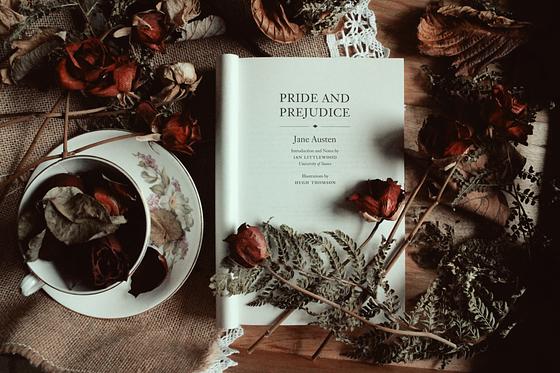
6. The Great Gatsby by F. Scott Fitzgerald
“He had one of those rare smiles with a quality of eternal reassurance in it, that you may come across four or five times in life. It faced, or seemed to face, the whole external world for an instant and then concentrated on you with an irresistible prejudice in your favor. It understood you just as far as you wanted to be understood, believed in you as you would like to believe in yourself.”
For your teen years, it can feel like the whole world is almost there, but just ever so slightly out of reach. Dreams for what can and could be fill your head and it's often hard to confront a more nuanced (but just as rewarding) reality. As a huge proponent of wild dreams, "The Great Gatsby" is a lesson to not let imaginings take over the real world.
Within the novel, the 'ideal' is told through varying characters, each longing after something from the others. Gatsby himself is an ideal for Nick Carraway, who often romanticizes the stories and experiences surrounding the mythical figure, and Daisy Buchanan is a portal to the past for Gatsby, who desperately clings to a chance once again at love (and the status that Daisy represents), while Tom and Myrtle offer each other an escape from everyday reality.
Every character is at once trapped and yet entirely privileged by the opportunities that come with wealth, so all of this introspective suffering is complimented with cocktails and jazz. For those who are struggling to separate the outside of calm from interior restlessness and big dreams, this is the novel for you.
Complement with: feminist readings on Gatsby's obsession, long drives to the beach and Lana Del Ray's 'Young and Beautiful' for Baz Luhrmann's 2013 film.
7. North and South by Elizabeth Gaskell
"I would rather be a man toiling, suffering—nay, failing and successless—here, than lead a dull prosperous life in the old worn grooves of what you call more aristocratic society down in the South, with their slow days of careless ease."
Also known as "Pride and Prejudice for the Industrial Revolution", Gaskell's novel follows a young woman named Margaret Hale as she moves from the sleepy village of Helston in the South of England to the North and the industrial town of Milton. There she meets the stern and imposing Mr Thornton (not the chocolate, rather a woolen mill owner).
North and South follows a similar path to Austen's novel but explores culture shock and inherited class prejudice, love and loss, as well as the toll on the working classes. Slightly less popular than its Regency-set counterpart, Gaskell offers a delectably romantic story that clashes with the cold reality of capitalism in the Victorian era.
Complement with: English breakfast tea, a flower-strewn meadow and the 2004 BBC production starring Richard Armitage and Daniela Denby-Ashe.
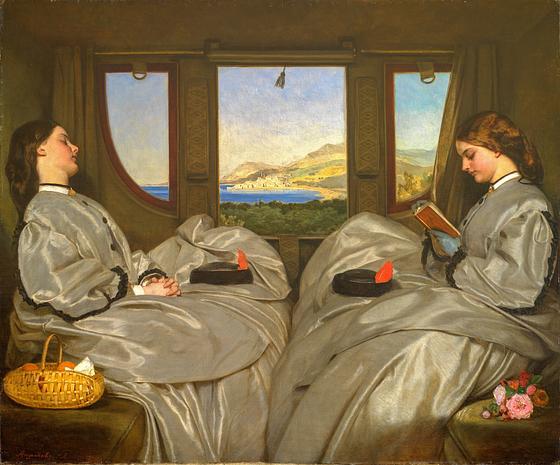
The Travelling Companions from Birmingham Museum Trust, Unsplash
8. Macbeth by William Shakespeare
"Come what come may,
Time and the hour runs through the roughest day.”
If "An Ideal Husband" and "The Great Gatsby" speak to an unwillingness to settle in life, they surely owe it to "Macbeth", i.e. the ultimate lesson to the ambitious.
With witches, magic and fate intertwined with political drama and murder, "Macbeth" often feels like a soap opera on steroids, making it, in my opinion, one of the more accessible and enjoyable of Shakespeare's plays. The ambition of his wife and the darkness she encourages within him is ripe for academic discussions but, ultimately, speaks to the influence of those around us on our choices and actions.
Throughout high-school/secondary, the friends you have will often have known you for years and build on your self-perception as well as have a hand in crafting the person that you are. Macbeth himself provides a good example of just how twisted this influence can get, and his wife offers a dark insight into what obsessive ambition can bring.
Complement with: not letting others dictate the future, a good stain remover for those pesky metaphorical spots and the horrors of Tudor-era c-sections.
9. Wuthering Heights by Emily Brontë
"Catherine Earnshaw, may you not rest as long as I am living; you said I killed you—haunt me, then! The murdered do haunt their murderers, I believe. I know that ghosts have wandered on earth. Be with me always—take any form—drive me mad! only do not leave me in this abyss, where I cannot find you!"
The Brontë's are often set side-by-side with Austen's novels though the two share only a little in common (and mainly that they were female authors at a time when this was revolutionary). "Wuthering Heights", in particular, couldn't be further from the polite, etiquette-driven plots of Austen's satirical romances, instead set in Victorian-era Yorkshire across blustering heathland and condemning the upper classes for their stitltedness, punishing Cathy's ambition when she gets to know the family at Thrushcross Grange, far removed from her family's house, the titular Wuthering Heights.
As a novel filled with unlikeable, selfish people, it can be hard to understand its everlasting appeal. But the characters, from Catherine Earnshaw, a young lady living at Wuthering Heights, who forms a deep, unsettling bond with her adopted brother, Heathcliff, drag you under the book's spell, even as the 'protagonists' behaviour descends further into violence and cruelty.
Complement with: walks on the Yorkshire moors, ghost stories and dramatic cries from a window.

The magic of classics is finding a resurgence recently and I couldn't be more grateful. Often a very cheap option (worth a quick Google or often found on Kindle for free), you can often have some great writing at your fingertips in mere minutes.
Once you've got the bug for classics, it's an enjoyable rabbit hole into a long history of writing, one that can lead you to incredible finds (Evelina was discovered from a documentary on the history of romantic love) or some slightly more suspect offerings (same documentary, Samuel Richardson's "Pamela" has rather too much emphasis on 'feminine chastity and humility' for my taste). Whatever genre you enjoy, you're sure to find something that suits your tastes and opens up a whole new world of reading material.
Comment down below with your best recommendations and why they're still relevant today!






